#retroclone
Text
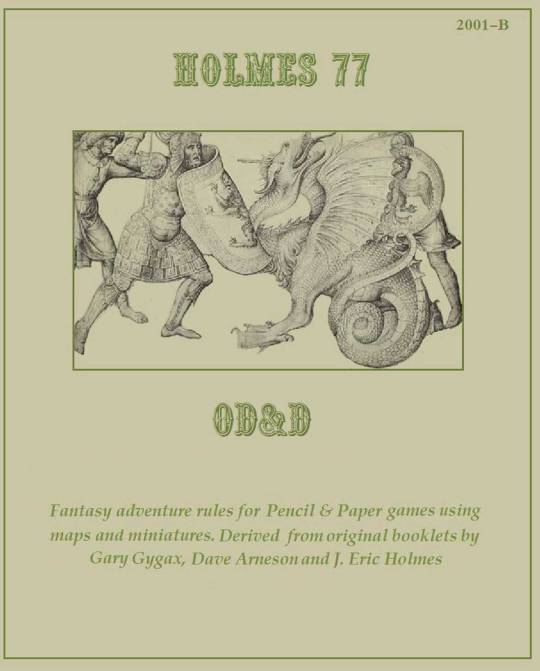
Holmes 77, one of many D&D retroclones compiled at:
Some PDFs are hosted at that site, and others are linked, with some older links now broken.
Another list of retroclones, OSR games, and OSR-like rules is hosted at the ynasmidgard blog, with a link to a googledoc in the first sentence of this post:
102 notes
·
View notes
Text
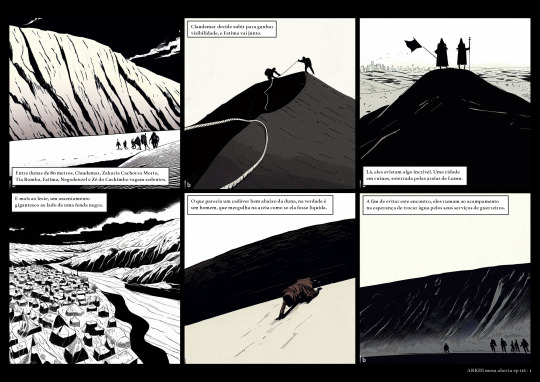
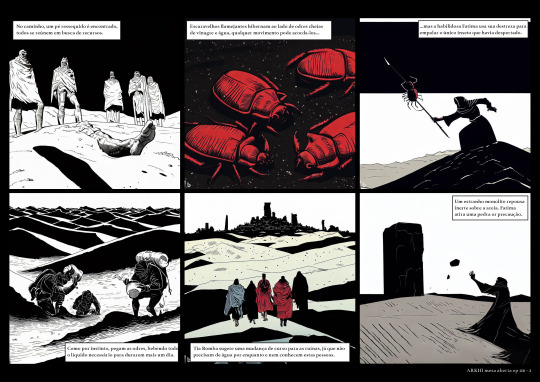
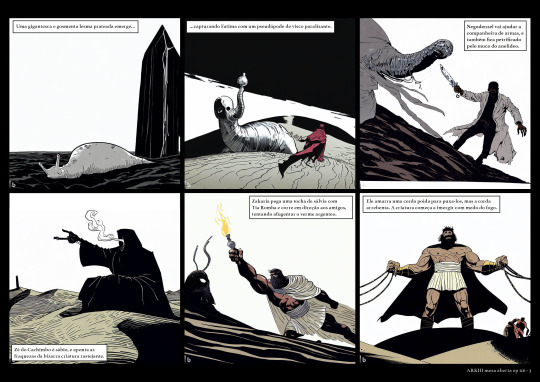
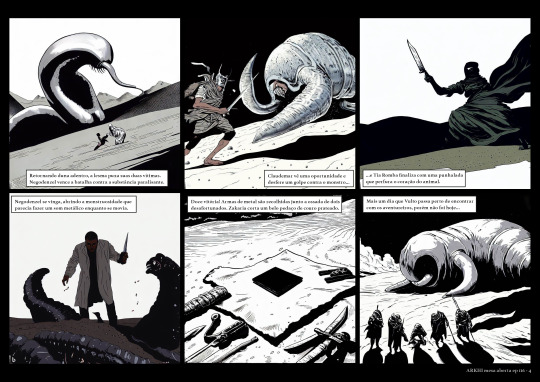
ARKHI: Mesa aberta - O Verme Argenteo (ep 116)
Jogadores: Felipe Duarte, Emegê, Bernardo Lima, Victor Barros, Ale Lopes e Túlio Cerquize
Mestre: Samuca Hernandez (Brainstorm RPG)
Nas tórridas dunas de areia negra do deserto de Lumn, aventureiros caçam tesouros na esperança de um futuro melhor. O perigo desta insalubre terra é agravado pelas ameaças quase alienígenas que aqui habitam. Para saber mais sobre ARKHI e Brainstorm RPG clique AQUI
#ARKHI#OSR#MESA ABERTA#WEST MARCHES#OSE#OLD SCHOOL ESSENCIALS#RETROCLONE#DND#RPG#WIERD FICTION#HORROR RPG#BRAINSTORM RPG
3 notes
·
View notes
Text
#roleplaying games#rpg polls#tabletop roleplaying games#ttrpg#ttrpgs#independent ttrpg month#indie ttrpg#retroclone ttrpg#labyrinth lord#swords and wizardry#whitehack#osric#ose#old school essentials#retroclone
1 note
·
View note
Text
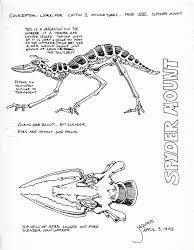
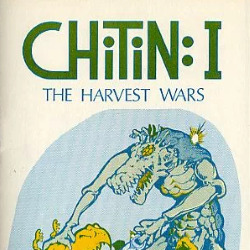
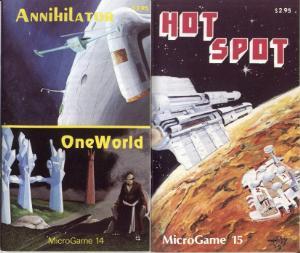
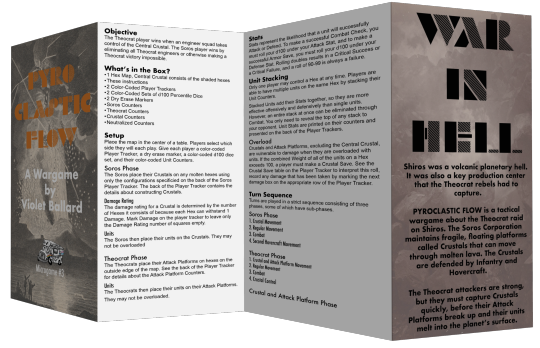
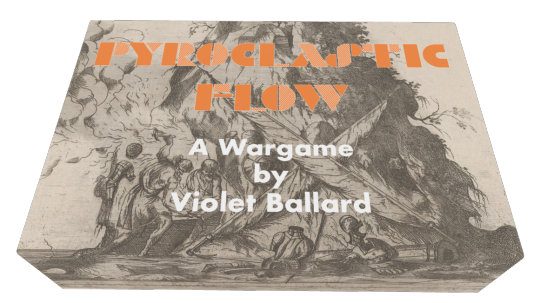
Violet is making nice micro games inspired by this series of old boardgames: https://maverick.brainiac.com/cmm/mic.html
She even craft small box sets: https://www.thegamecrafter.com/crowdsale/pyroclastic-flow
But being a small boardgame publisher seem even harder than being a small roleplaying game publisher.
Oh also check, Jennell even illustrated the old Chitin game, love her lil bugs:
29 notes
·
View notes
Text
I've been thinking/ruminating a lot lately about D&D: especially old-school games, and long form campaign play. Partly because I'm feeling very autistic about it, and also out of nostalgia for my university campaign that just kinda fizzled...
And what with our current 5e campaign going, and my space opera campaign on pause & waiting in the wings, AND the fact that I have chronic fatigue plus a job, I really don't see any of the above getting outside my brain for 2+ years.
So I'm feeling a lot of emotions about it 😢
#personal#D&D#long form play is just more interesting to me than oneshots & short campaigns#i like the way the world and the party's relationship network grows organically over time#being a player is fine#but I desperately want to GM again and the fatigue just makes that so hard#i want to take the novice enthusiasm of my uni campaign#and pair it with a decade of experience#and a better system than a retroclone of B/X#(no disrespect to B/X enthusiasts but it's just unpolished & uninteresting to me)#(but I do miss the barebones simplicity and focus away from hours-long combats)#it's past my bedtime and I should be trying to sleep#but instead I'm feeling sad & angry about my chronic illness#tireeblogging
5 notes
·
View notes
Text
Sometimes I think I want to do a retroclone of an RPG, but one that's not a D&D. JK's Mutants in the Now of course, does this for a certain mutant animal rpg, but what I want to do is nowhere near as cool.
I want to do a retroclone of some of the incredibly janky "This came out of wargame publisher trying to get on the bandwagon and just writing their rules for an RPG like they did the wargames."
Four columns of text per page. Decimalized section headings where you've got to go to 14.3.1 to get to the magic rules and the rules for character advancement are buried 25.7.2 and vaguely imply that you can spend downtime days working out to earn XP and in fact, that may be more efficient than going on adventures with the default reward scheme for them. Whole sections of the magic rules based on the Goetia or some old "magical properties of herbs and gemstones" stuff.
I'm talking SPI's Dragonquest. I'm talking POWERS AND PERILS. Maybe a little bit of Tunnels and Trolls, even, though that was a lot more explicitly "This is our D&D houserules as a game"
And don't get me wrong, there's some fun ideas buried in these. No classes, but broad skills is common to a lot of them. Dragonquest ditches mental attributes entirely; there's no int or wisdom, just 'magical aptitude' and you're explicitly encouraged to tank your magical aptitude if you don't want to be a magician; setting it as low as it can be means you get a bonus to your magic resistance, making it one of the first games to consider 'Hey what if there were upsides to minimizing an ability"
(This fun stuff is often buried under a crust of weird biotruth opinions, but it's still there.)
But first, I'm going to finish Hollywood Underhills. Probably.
1 note
·
View note
Text
The real essential features of an authentic Super Nintendo retroclone:
Title screen whose art style looks nothing like the rest of the game
Menu goes "bwoop"
Only ever hearing the first seventeen seconds of the best song on the soundtrack because it inexplicably plays exclusively in one particular transitional area where nothing ever happens
That one specific electric guitar sample
Doing stupid tricks with multi-plane parallax; bonus points if it involves a sunset
Default controller mapping assigns something odd to the shoulder buttons because the developers were still figuring out what to do with them
The player character walks behind a semi-transparent object
Important mechanics and/or critical plot information documented only in the game's attract mode, which it has in spite of not being an arcade port
Mutiplayer support in incongruous places
Mode 7 map screen
2K notes
·
View notes
Text
Introduction to the OSR
what's an OSR? it's a game that's kinda like old-school D&D. or is old-school D&D. or is compatible with old-school D&D. an OSR game generally has some or all of the following principles:
low character power with highly lethal combat. in old-school D&D a 1st-level fighter has d8 hit points and a longsword does d8 damage, and you die at 0HP. this is not to ensure characters die all the time but to emphasize the next bullet point:
emphasis on creative problem solving. most situations cannot be solved by straightforward use of your abilities (such as charging into every situation with swords drawn, if a fighter), so the game tests lateral, outside-the-box thinking.
emphasis on diegetic progression. spells are found, not obtained automatically on level-up. you get XP by finding gold more than killing monsters. most of your cool abilities come from magic items. making alliances & hiring followers is encouraged.
focus on managing inventory, resources, risk, and time. the players are constantly faced with meaningful decisions; this is the heart of the game.
very sandbox-oriented. the focus on creative problem solving means the game must be accommodating to players taking a course of action the GM didn't plan for. use lots of random tables to generate emergent story. some elements of new simulationism.
high tactical transparency, i.e., the optimal course of action is rarely system-specific, and ideally very possible for a new player to intuit.
usually semi-compatible with old D&D, but not always. usually rules-lite, but not always.
what does the OSR mostly NOT do?
focus on character builds. these change the focus too much to be on the rules than the fiction, can create situations where stuff everyone should be able to do is an ability locked to one class, and impede tactical transparency.
resolve everything with a die roll. combat uses dice to be scary, unpredictable and most importantly not your default course of action. everything else should bring up dice rarely - dice are your plan B when your plan A fails. the best plans need no dice.
use linear storytelling or put players into a writer/GM role. linear storytelling gets in the way of the decision-making so core to the playstyle; letting players write details into the setting is mutually exclusive with them discovering it.
rules for everything. 400 pages of crunch is worse at simulating a believable world than the GM and players' shared understanding. OSR games rely constantly on GM ruling.
mostly still applies to all the above. making your system a "pure" OSR game comes second to doing what's best for your game.
System recommendations
old D&D or a retroclone
old-school D&D - or old school essentials or basic fantasy or swords & wizardry, which are old D&D's mechanics repackaged with quality-of-life tweaks (and the upside of not giving WOTC your money) - are usually the go-to when recommending someone's first OSR game. they're actually not my first pick, though!
PROS:
very complete, with more robust rules than a lot of the lighter games on this list.
100% compatibility: most OSR adventures are statted for old school essentials. converting them to other OSR systems is usually simple, but not 1-for-1.
easier to find games for. anyone interested in the OSR space knows what old school essentials is.
CONS:
jank. these games largely still have weird saves, level limits for non-humans, some still have descending AC, etc etc. it's not that bad but it is there
i hate thief skills. lots of essential dungeoneering actions are locked to the thief class as abilities, with abysmally low success chances. this is stuff i prefer being handled without a roll. thieves in this system suck and make everyone else worse at dungeon crawling by existing.
there's just lots of really cool shit in other systems i'm about to go into that you just don't get here
Knave 1e and its various hacks
this is a 7-page super-lightweight system that boils everything down to just the essentials.
rolling a character takes like 5 minutes. roll stats, roll gear, roll traits, go. done. it's great.
characters are defined entirely by stats and gear, no classes. wanna be a fighter, have high strength and carry a big sword and armor. wanna be a wizard, have high intelligence and fill your inventory with spells. item slots are elegant and pretty limited.
initiative is instant: roll d6. 1-3, monsters go first. 4-6, PCs go first. swingy, but god it is so smooth and shaves like the most boring 5 minutes off of every combat
monsters are so very elegant. old D&D gives monsters a "hit dice" rating to determine their HP, e.g. a 3HD monster rolls 3d8 for hit points. knave takes this number (HD) and uses it for attack rolls and saves (aside from exceptionally bad/good saves), so a knave statblock looks something like this.
spells are all one or two sentences long & extremely easy to remember.
7 pages is so light. i have the system basically memorized.
DOWNSIDES: there's no dungeon crawling rules (standard for meatier OSR games & something i consider essential) and no real bestiary, though the second point isn't a huge deal cause they're so easy to make. it also kinda assumes you already know how to run OSR games, so there's very little real advice or guidance.
KNAVE HACKS
knave 1e is in creative commons & comes with an editable word doc for you to publish with modifications, so there's a ton of variants (there was a spreadsheet of them somewhere, but i can't find it).
Grave is a favorite - i'm two years into a grave campaign and it's fantastic. it's a dark-souls-y version of knave with some really elegant innovations.
you have a set number of deaths before you for-reals die, as every character plays an undead as is dark souls tradition. makes it good for OSR beginners! being able to tell when you're close to your final death is really good - it lets you emotionally prepare for losing your character & raises the stakes more the more you die. (though honestly you should probably cut the number of extra deaths in half, it's super generous)
XP and gold are combined into one resource, souls. legendary creatures drop big souls you can make into magic items. this has ended up being the coolest thing in my current campaign. my players love finding powerful souls to make into magic items it's so fun
uses preset packages of stats/gear instead of knave's rolled ones, filling the role of more traditional character classes. has the wonderful side effect of not making you get stuck with low stats cause you rolled bad one time.
you have stamina equal to your empty item slots. you spend stamina on spells if you're a caster, or free maneuvers (on top of your attack at no action cost) if you're not. it's super elegant.
there's 3 classes of spells: wizardry for intelligence, holy magic for wisdom, and witch stuff for charisma. nice and intuitive.
there's a page of 50 magic items each a couple sentences long. this PDF is worth it just for the magic items.
DOWNSIDE: see the downsides for knave 1e. all still apply.
i enjoyed grave so much i made a variant of it with the dark souls bits removed (and some dungeon crawl rules added!) to use for my standard fantasy campaigns.
Knave 2e
sadly knave 2e is not purchasable yet (i backed it on kickstarter so i have access, though). but when it comes out i highly recommend it.
much larger and denser than knave 1e. it finally has dungeon crawling rules, it has GM and player guidance, everything is refined and the layout is so so nice and readable.
combat is a bit more interesting than 1e. you can break your weapon against an enemy to deal max damage. you get a free maneuver on high attack rolls.
there's rules for stuff like alchemy, warfare, building a base. it all kicks ass.
there are so many goddamn tables. i rifle through it anytime i need inspiration.
DOWNSIDES: i personally can't think of any! it's a very complete good functional system.
Mausritter
you play tiny little mice! in a world full of big dangerous things that want to eat mice. cat = dragon. you get it. what more could you want
the mouse thing is just super intuitive. you get the dynamic between you and the big scary lethal world. fantastic OSR game to introduce kids
nice and robust ruleset; nothing feels missing
tons of super nice GM stuff! faction rules, tools for rolling up hexcrawls and dungeons, plenty of tables
super clean readable layout. font isn't too small to avoid being intimidating. guidance is really nice and clear.
combat is autohit. super fast & lethal.
100% free
look mausritter is just. good. i wanna run it so bad someday
Worlds Without Number
sort of a middle ground between OSR stuff and 5e.
lots of classes, at least in the paid version. the free version comes with just the warrior, expert and mage. there's feats and more of a focus on builds than most OSR games. if you like more mechanical build variety than a typical OSR game, this is a great game for you!
extremely good multiclassing. y'know how in most games if you just mash together two classes you think are cool you'll end up with a total mess? not here! every combo is viable and works fine! easily the best multiclassing of any game i've touched
an absurd amount of GM stuff and tables. easily more than any of the other stuff i've praised for also having them. but personally i haven't dug into them as much, so i can't really comment on them
skills the way modern D&D has them. you roll dice and try to beat a target number. i don't tend to like rolled skills, but most people do, so if that's your thing WWN has them
DOWNSIDES
the layout is terrible. everything is a huge wall of text with very little use of bold text or bullet points to draw attention to the important bits. the table of contents has like 15 things in it for a 400-page book! i couldn't find any of the paid-version-exclusive classes for like a month after i bought it! looking up rules is a nightmare.
the way the default setting handles "evil races" is like an exaggerated parody of all the problematic aspects of how D&D handles it. like, it wants so bad for you to have an excuse to genocide sentient free-willed people. but at least the default setting is easy to chuck in the trash
Dungeon Crawl Classics
the goal of this system is to take all of the crazy gonzo moments people remember playing old-school D&D in their childhood and turn all of that up to 11 while cutting the stuff that doesn't add to that. i think a lot of its innovations have ended up kind of standard in newer OSR stuff (like fighters getting maneuvers with their attacks), but it still has more to offer.
the funnel: you start the game with four randomly rolled dipshit peasants that you then throw into a meatgrinder to get horribly killed. you pick one of the survivors to be your 1st-level character.
maneuvers: fighters roll an extra die with each attack that gets bigger as you level. if it's a 3 or higher, you get to do a cool thing on top of your attack. pretty standard for OSR games, but this game popularized it!
crit tables: fighters also get more crits and nastier crits as they level. every crit, you roll on the crit table. maybe you chop off a dude's arm. maybe you just knock them over. maybe you shatter their shield. it's very cool
spell tables: i don't really like roll-to-cast mechanics, generally. but DCC goes so all-in on roll-to-cast that it still looks fun as hell to watch. you cast a fireball and maybe it goes how you want. or maybe you explode, or you nuke everything in a half-mile radius, or from now on you permanently ignite flammable materials you touch, or whatever. casters just have to put up with turning into a weird mutated mess across a campaign
there's no dungeon crawl rules, no encumbrance - this game is all about the big over-the-top wacky shit, and is not really interested in the more down-to-earth number crunching. it's more in the you-die-hilariously-all-the-time area of OSR than the you-avoid-death-through-clever-play area. not really my thing but the system knows exactly what it wants to be and i respect it
iron halberd
this one is mine! as the author i'm not qualified to tell you what isn't good about my system, so just assume it's worse than i make it sound, but here's a bunch of the selling points
semi-random character creation where you flip back and forth between rolling dice and getting your own input. roll stats, pick ancestry. pick starting gear kit, roll different dice based on which kit you picked. etc etc. stats are random but all equally viable (no rolling incredibly low or high stats). every time i run this game the character creation is a hit. seriously go roll up a character it'll sell you on the whole thing
you start out a lot stronger than a standard OSR character but grow way more slowly. i don't like 4th-level characters being 4 times as strong as 1st-level ones; HP never gets that high. emphasis is more on diegetic progression instead.
way too many subsystems for alchemy, crafting, strongholds, warfare, renown, rituals, likes 9 pages of magic items, a whole subsystem for becoming a cleric mid-campaign. i couldn't help myself i love this shit
in my current campaign we had a player permanently sacrifice some max HP to become a necromancer after deliberating on whether that's a good idea for like thirty seconds, which instantly made me think my necromancy system is a success
also free
Adventure recommendations
(in rough order of size)
Moonhill Garden (by Emiel Boven): look at this. look at it! this is like the best template for a little dungeon in an OSR game. all of the little factions are tied together. this would be a great oneshot to introduce people to an OSR system with.
A gathering of blades (by Ben Milton): a system-neutral, one-page sandbox. i ran this for an iron halberd game and it went super well. lasted like 7 sessions. highly recommend.
The Waking of Willowby Hall (by Ben Milton): a single dungeon with a million things going on. it's super chaotic with half a dozen different factions crashing into each other and a big angry goose. highly recommend, especially for kids
The Black Wyrm of Brandonsford (by Chance Dudinack): small sandbox with a fun fairytale vibe and a very fleshed-out little town. and a big nasty dragon.
Evils of Illmire (by Zack Wolf): this is a very dense, entire campaign's worth of hexcrawl in a very compact package for like $5. it doesn't do anything particularly new, but the value-for-money is absurd and it's a really good template for how to do a sandbox if you're used to 5e adventures
Ask me anything!
if anything here is unclear or intrigues you, send me asks! i love helping people get into OSR games. i'll link frequently asked questions here if i get any.
#osr#nsr#ttrpg#d&d#iron halberd#knave#worlds without number#dungeon crawl classics#mausritter#l2j archive
312 notes
·
View notes
Note
What adventure would you suggest to see what Really Good and narratively satisfying dungeon crawler looks like?
There's a few I'm particularly fond of personally:
Sunless Citadel for D&D 3e (also reprinted in some place or another for 5e): The first official module for D&D 3e is by no means perfect, but it still contains all the necessary elements of a dungeon crawl with just one tiny hook needed to draw the characters in and no necessary order in which to complete it. The first level is characterized by a conflict between goblins and kobolds that player characters can get involved in, which emphasizes the fact that even the inhabitants of dungeons aren't there just for the sake of serving as XP piñatas. The first level even has multiple possible routes for characters to take, including one that is ultimately a dead end that leads into an entirely optional super-difficult fight which I don't remember if it's very well telegraphed, but even its placement there suggests that there can be reason for characters to revisit dungeons later. The second level isn't great, because it's basically a linear gauntlet of encounter on the way to the goal, but it also provides an easy avenue for expanding the dungeon into further adventures with a route to the Underdark.
Incandescent Grottoes and Hole in the Oak for Old-School Essentials. These two modules are both written for Old-School Essentials, a retroclone of the old Basic/Expert edition of D&D from the eighties. As such, they have very different assumptions, including no reason for the characters to go there than just the desire to explore and get treasure. But they're really good non-linear dungeons focused on open exploration as well as a degree of puzzle solving. Incandescent Grottoes especially has very open architecture allowing for multiple avenues of movement between the two dungeon levels (at least four if not more) and both modules have sufficiently detailed NPC factions with webs of relationships, meaning there's room for getting involved in so many tiny narrative hooks while exploring the dungeons. Also, the two dungeons can explicitly be connected together to make for a massive starter level dungeon with enough to explore for at least half a dozen sessions, and there are even story hooks that connect the two dungeons (I won't spoil it in any more detail, but the NPC faction in one dungeon is looking for NPCs holed up in the other).
Isle of the Plangent Mage, also for Old-School Essentials. This module is more than just a dungeon crawl, since it's also a small, self-contained wilderness exploration module, but a lot of the praise I gave the aforementioned module applies here. Most of the module is however taken over by a multi-level dungeon which is a Wizard's underwater lab where they were conducting experimence. What sets Isle apart from those two is that it's one of those dungeons where through exploring it player characters uncover the place's history and if they so choose they can actually take it upon themselves to finish the wizard's job, which will then open more avenues for exploration.
Do not that the latter three adventures don't have narrative content in the sense of "a prewritten story for player characters to get involved in," but in the sense that they all allow players lots of freedom in terms of where to take their characters and multiple situations they can poke their heads in. Even if they just want to loot they will still see weird sights and experience cool events while doing so.
77 notes
·
View notes
Text

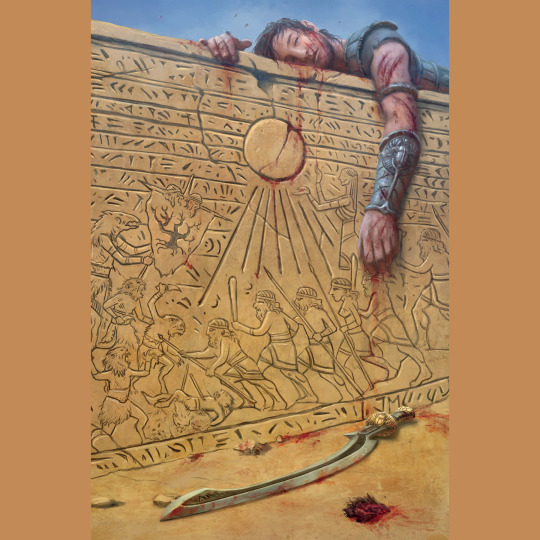

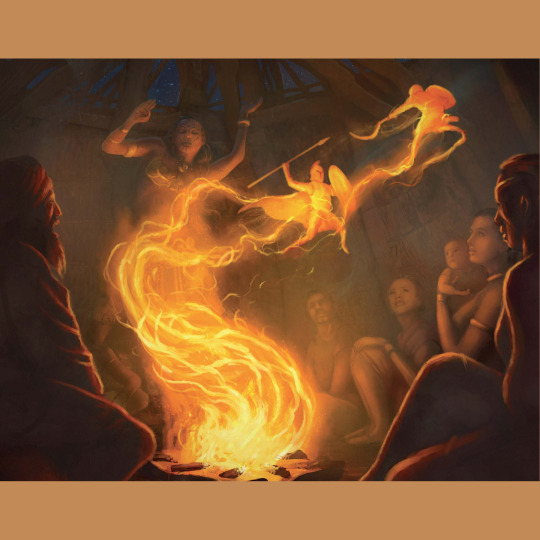
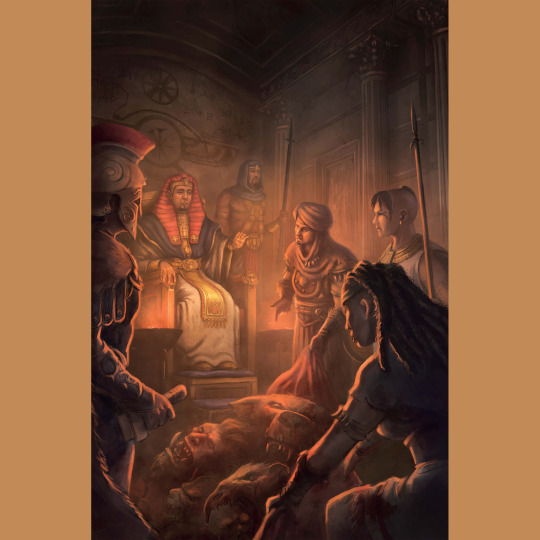

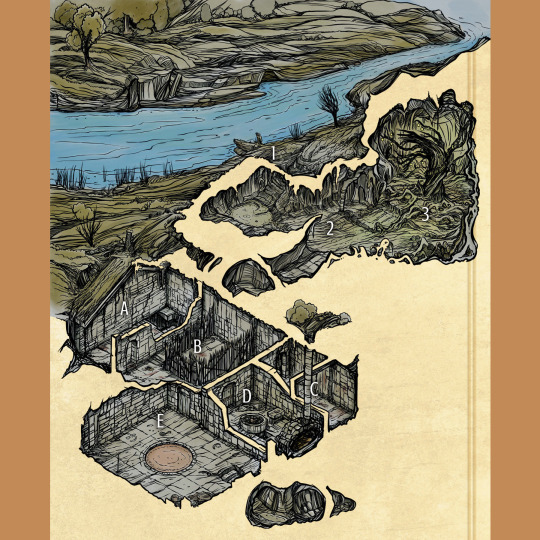
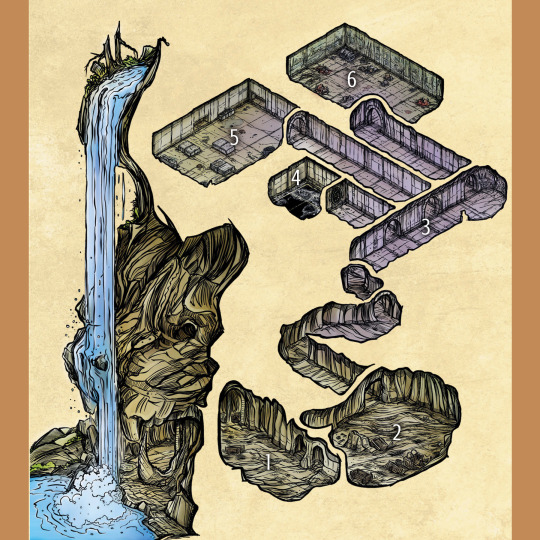
Jackals (2021) is Osprey’s most ambitious RPG to date, the first to launch with an accompanying campaign. An additional sourcebook has also surfaced.
Back in 1982, Chaosium published QuestWorld, as a sort of open world for RuneQuest (as opposed to the closed, Stafford-approved Glorantha), where players would essentially come up with their own RQ variants. The box set was an interesting, but failed, experiment. Jackals strikes me as the sort of thing I bet Chaosium hoped would emerge from the scheme.
It is powered by OpenQuest, a tweaked retroclone of RuneQuest. Jackals tweaks it some more, but at heart, if you’re familiar with the BRP style d100 skill games, you’ll ken this system fast.
Like RuneQuest, the game world is extremely important. Characters get the choice of one of four cultures (modeled loosely on the real world Bronze Age cultures of Greece, Egypt, Israel and the Arabian desert), each of which determines the bulk of their baseline attributes. As the titular Jackals, they wander the world, beloved by communities beset by the taint of Chaos, manifest as a variety of beast-people who kill and destroy indiscriminately, a sort of embodied anti-civilization. When no such problem exists, though, most folks don’t want Jackals around.
The world they wander is a rich one. I love Glorantha for its strangeness, but the War Road feels familiar (thanks to its dim relation to our Middle East). That gives the setting a kind of excitement akin to knowing the song on the radio, even if it is a cover. The mysteries are intriguing, the art lovely and the maps! My goodness, these are some of the best dungeon maps I have seen in years! A handful of scenarios round things out and pave the way for the grand, world-changing campaign, The Fall of the Children of Bronze.
97 notes
·
View notes
Text
I'm already know for being very opinionated and having some Hot Takes, but I still usually keep it in line and fairly reasonable. Typical "Unpopular (but still somewhat safe to voice) Opinion" territory, where I might get some blocks and some scowls, but like, nothing major.
However I'm... gonna be posting an uncharacteristically rancid take this time.
I cannot fucking STAND vibes based design. Its become a trend lately to explain game systems by vibes, and it feels EXACTLY like the tropification of romance novels. A thing so many other people have complained about far more than I have, where so many works of fiction are now just being advertise as "Its a queer little slow burn, found family story that features enemies to lovers" OKAY, BUT WHATS THE FUCKING BOOK ABOUT?
And I feel like over the past 15-20 years, the TTRPG industry has been having the exact same issue. I can go through dozens of listings on itch.io for indie games and not see a single fucking game mechanic mentioned, and its frustrating. "This game is about gathering your friends to turn your local farm into a sustainable commune!" WHAT KIND OF FUCKING DICE DOES THE GAME USE? DOES THE GAME EVEN HAVE A GM?
And like, this isn't just about the feel good warm and fuzzy games. OSR is JUST as fucking guilty in this. "This game is a black metal death crawl through your worst nightmares." IS IT A RETROCLONE? IS IT A RULES LITE D6 SYSTEM? HOW THE FUCK DO I RESOLVE AN ACTION? DO ENEMIES USE STATBLOCKS?
If a video game showed absolutely no gameplay in any of its advertisements, only showing concept trailers and cutscenes and talking about its plot, you would probably shy away and think the game isn't worth playing if it can't even stand on the merits of its own gameplay. So why the fuck are we accepting that as the norm in TTRPGs?
#special shout out to Avery Alder#Avery I fucking love your games#The Quiet Year is one of my favorite games ever#its pretty much my go-to for any campaign of any kind to give players control over the worldbuilding pre-session 0#BOB is so well designed and such a rad way to handle diceless/GM-less design#and I ABSOLUTE understand the need for queer designers like us to carve out a space and stand our ground#in a hobby that has historically housed people who want people like us dead in a ditch#but the idea that BOB can only support inherently queer/marginalized stories is ABSURD#and the way every BOB game advertises itself/is listed on your site makes me want to tear my skin off#please#you designed a game#AN INCREDIBLE ONE at that!#please please let it stand on the merits of its own design instead of just the vibe its built for#I was about to post this on my game design blog...#but I really dont have the heart to do that. This isn't actually about game design and the industry its just... personal frustration#and the fact that the thing that makes me autistic about games to the point to where I have spent like 25 years studying them#is just... no longer even the main focus it feels like
22 notes
·
View notes
Note
Your post actually got me curious about b/x d&d. Any chance you know where I can get it?
(This post, for context)
Well... if we're talking LEGAL ways to get it, both the Basic and Expert rulebook of the B/X set are on DrivethruRPG for like $5 USD each. If you want a physical copy you'll have to print the Basic rulebook yourself because for some reason only the Expert rulebook is avaliable on print on demand.
I'd recommend grabbing the Basic rulebook first to test the game out, and if you like it then grab Expert (the Basic Rulebook covers character advancement for levels 1-3 while Expert covers levels 4-14 and adds mechanics for stuff like wilderness exploration)
If you don't want to pay for it (who does, really), there's also this little nifty Google Drive folder I put together with both rulebooks plus adventure modules B2: The Keep on the Borderlands (which originally came bundled with the Basic rulebook), X1: The Isle of Dread (Which originally came bundled with the Expert rulebook) and B4: The Lost City (which a lot of people consider to be the best adventure module from the B/X line).
HOWEVER
If you're coming from a later D&D edition (like, post-3e) I'd kinda recommend instead checking out Basic Fantasy, which is a pretty faithful open-source B/X retroclone (meaning it's basically a recreation of the same game but with the D&D trademark filed off).
Mechanically speaking, Basic Fantasy is practically identical to B/X D&D, except removing some of the mechanics that might seem counter-intuitive to modern D&D players such as race-as-class or descending AC.
17 notes
·
View notes
Text
A few more short games
There are some games I own that just don't have much interesting going on, and don't warrant a full entry on their own. Here are the ones I've read recently.
Perfect Fantasy (Goodgames, 1987), a D&D1e knockoff that renamed Elves to Sindar and added a few new types of them. That's it. No further changes. Cool stuff: I guess technically you could call this a really early retroclone?
Rocket Dinosaur (coolio2, 2015), a fast-paced extra-hackable game that could have been as big as Lasers & Feelings if it were only published earlier. Cool stuff: it's just one double-sided page, the back of which is entirely kids' drawings of dinosaurs.
SCPRPG (unknown, natch; 2021), which is nothing but a reprint of a bunch of SCP articles with GURPS Lite slapped on it. Two separate lawsuits now prevent the distribution of the game. Cool stuff: at least the SCP articles they picked were good ones.
Gay Catgirls Smoking Cigarettes (ztepokorp, 2023), in which you play exactly that. You're in college and/or dropouts, you just kinda hang out. There's not much tension unless you roll your own. Cool stuff: Uses the actions of random passers-by as a resolution mechanic. If you play at home you're encouraged to have the TV on so you can use the actions of whomever's on screen.
Lonely Mountain Fun (74outlier47, 2018), which is a layer game. You play D&D or some other fantasy RPG, but you skip playing out the adventures. It's mostly 16 pages of advice and some "home front" rules. Cool stuff: Really holds firm on its tone. This is not "finding the adventure in the everyday", it's a collection of home and village scenes. Sadly it's not very fun in tone or in practice.
21 notes
·
View notes
Text
Teaching my parents how to play DND for my mom's birthday. I'm using Old School Essentials bc it's my retroclone of choice and my parents were always curious about what their friends were doing when they played B/X or AD&D back in college
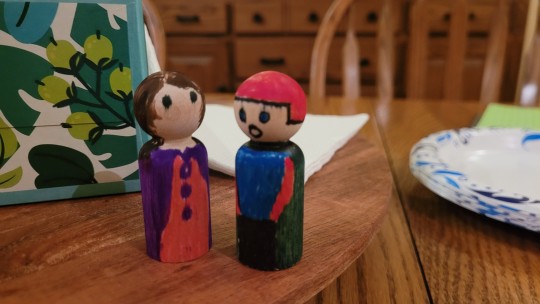
They're getting so excited. They even doodled on some wooden craft dolls for minis
16 notes
·
View notes
Text

What waits quivering beneath the crashing sea? Read The Isle, written by Luke Gearing and published by Spear Witch, to find out.
Designed for The Vanilla Game RPG, a lightweight retroclone OSR-system, The Isle is a body horror dungeon crawl adventure that’s pretty playable in most fantasy RPG systems with minimal reworking. I could see someone running it with Mörk Borg without much issue. This review is of the physical book, but it also comes with a PDF and an EPUB (yay EPUB!).

Something draws your players to the isle, a mostly forgotten, small, and haunted piece of sea-locked land that 10 monks call home. The party is likely to either force or lie their way to the seal: a bone-porcelain disc hidden beneath the monastery floor. Once broken, adventure calls from below, where there awaits hundreds of years of horrors with lore and worldbuilding woven into the fabric of each room…
There are 5(ish) floors of around 10-20 rooms each in this adventure. But what about these floors is so evocative? The dungeon is a bit indescribable as a whole. Strange and violent creatures with alarming habits occupy this prison. Floor 1 is close to what you’d expect to find in a dungeon near the sea, but the domain grows more horrifying the farther down intruders go. One of the “floors” is actually the inside of a huge mysterious sea-thing where players navigate through organs.
The creatures are sublime. Beyond being just undead, they’re wonderfully described and horrifying. They’re not all dangerous, and some even promise power. Players might meet an amalgam of pony teeth that rolls around chewing air and stone, choose between helping two undead brothers permanently remove the other from this plane, assist a worm in its quest to ratatouille a giant sea-thing creature, or just die to one of the many interesting yet easy-to-deliver traps...
Read the full review on my website! 👇
41 notes
·
View notes
Text
Since I am still chewing on the DIE Stapling post, I am going to do another about effort mechanics in ttrpgs because I am trying to write that Blasphemous inspired Trophy Gold hack (placeholder name: Penance). And one of the coolest mechanics for Trophy is its Risk Roll, which is basically an effort mechanic.
"But, Ampersand, what is an effort mechanic?" I hear you ask, dear mutual I am making up in my head. An effort mechanic allows you to reroll an action you have already attempted but failed or to get a bonus to a roll at the expense of some resource. Usually, that resource being the character's health. But it can also be something else like clues in an investigative game or even a narrative consequence (but that's usually called a Devil's Bargain).
The important part is that it gives a benefit but requires a sacrifice. And that's when the whole fanfare of psychoeconomics start. Because you need the sacrifice to be big enough to give the player pause and not use it every roll. And also you need the benefit to be significant enough to make it worth the risk and the expense. If properly adjusted, an effort mechanic can become a slow but sure spiral into the characters downfall.
Let's look at some examples!
Numenera is the first system I learn that had such a mechanic (but certainly was not the first ever). It is pretty straightforward in its implementation, too. You spend a fixed amount of the appropriate life pool and you get to reduce the difficulty of a task. Easy enough. But Numenera, being a tradgame as it is, the power creep upends any weight of the sacrifice. Once you level up enough, your pools become deep enough as to make effort something to just add to whichever skill roll you thought it needed a bit more oomph. This is not something wrong per se, but it can easily make your characters overly competent!
On the other hand, there's Dungeon Crawl Classics. DCC is a peculiar OSR game in that it is a really spiced up retroclone, wriggling DnD B/X ruleset to a point where it is almost unrecognizable. I am sure there are plenty effort mechanics peppered in the text, but I want to point out its magic system because I absolutely adore it. To be a wizard in DCC requires active dedication. That is because almost every spell has a writeup of about an A4's length, filled with the various effects a spell may have once the dice is rolled. And the effect can be wildly different from a roll of 5-10 to a roll of as high as 30 or more. There are many ways in which you can tweak your narrative positioning to get bonuses to a spell roll (components, helpers, magic foci, whatever), but when the die is cast and the result is just not good enough you still have a last chance: to sacrifice your own atribute values to get one last push that might be the difference between a proper spell and a fiasco. This is the main cause of withering of elder wizards: they have sacrificed too much in order to achieve the power they sought.
And then, there's Trophy. Both Trophy Dark and Trophy Gold have excellent effort mechanics baked directly into their ADN thanks to the masterful procedure that is the Risk Roll. These are games in which you are tempted first and consumed later by an evil forest. You have a really small ruin pool and once it is filled, you are lost to injury or its dark influence. You are also a destitute adventurer that needs to get any gold or face almost certain death. So you need to get shit done, you need to amass enough successes as to bring bread home and you need to survive the process (or try to, at least). And that's when the Risk Roll comes and lures your with the most satisfying effort mechanic I've ever seen. You can always make a reroll, adding an extra die to your pool to boot. But if those extra dice, dark dice, ever become the highest ones, you automatically mark ruin. You get your success, yes. But you become closer to losing yourself. It exactly hits the spot between actually worth it and inescapably dooming the character.
Obviously not all games need to be about losing oneself to fate or circumstance, but I feel an effort mechanic very much pushes the narrative in that direction. You are sacrificing yourself, in order to achieve your goals.
And I think that's a quite powerful narrative device.
#indie ttrpgs#ttrpg#indie ttrpg#rpg#ttrpg design#osr#numenera#dungeon crawl classics#dcc#trophy#trophy gold#trophy dark
29 notes
·
View notes